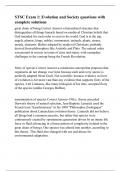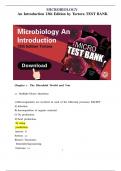Carl linnaeus - Guides d'étude, Notes de cours & Résumés
Vous recherchez les meilleurs guides d'étude, notes d'étude et résumés sur Carl linnaeus ? Sur cette page, vous trouverez 257 documents pour vous aider à réviser pour Carl linnaeus.
Page 3 sur 257 résultats
Trier par

-
STSC Exam 1: Evolution and Society questions with complete solutions
- Examen • 11 pages • 2024
-
- €14,56
- + en savoir plus
great chain of being Correct Answer-a hierarchical structure that distinguishes all things linearly based on medieval Christian beliefs that God intended for such order to exist in his world. God is at the top, angels, planets, kings, nobles, commoners, animals, plants, stones, metals, elements. Before adopted by medieval Christians, probably derived from philosophers like Aristotle and Plato. The natural order was present in society in terms of class and status, with exemplary challenges to the...

-
BYU-I Bio 181 Evolution exam Questions With 100% Correct Answers.
- Examen • 14 pages • 2024
-
Disponible en pack
-
- €8,15
- + en savoir plus
Biogeography Analogous structures - Structures that look the same, but not because they shared a common ancestor homologous structures - Structures that look the same because they did share a common ancestor James Hutton - Geologist that believed in deep time (meaning the earth is super old). Charles Lyell - Believed earth of 4.6 billion years old Got idea from James Hutton Carl Linnaeus - Created binomial nomenclature Alfred Wallace - English contemporary to Darwin Published his resea...

-
MICROBIOLOGY EXAM 1 (CH. 1-6) WITH COMPLETE SOLUTIONS 100%
- Examen • 34 pages • 2023
-
Disponible en pack
-
- €12,61
- + en savoir plus
MICROBIOLOGY EXAM 1 (CH. 1-6) WITH COMPLETE SOLUTIONS 100% The current system of nomenclature for organisms was established by A. Pasteur. B. Jenner. C. Linnaeus. D. Koch. - correct answer C. Linnaeus Scientific nomenclature assigns each organisms two names: the genus and the A. kingdom. B. specific epithet. C. family. D. class. - correct answer B. specific epithet. Archaea, often found in extreme environments, are divided into A. two main groups. B. three main groups. C. fou...

-
MTEL General Curriculum Exam Questions & Answers 2024
- Examen • 37 pages • 2024
-
- €10,67
- + en savoir plus
MTEL General Curriculum Exam Questions & Answers 2024 Marie Curie - ANSWER-Studied radioactivity. Won Nobel Prize for physics and chemistry. First woman to win one and first person to win two. Discovered the element radium. Dmitri Ivanovich Mendeleev - ANSWER-Created the periodic table of elements. Nicolaus Copernicus - ANSWER-Came up with the idea that the Earth and other planets revolve around the sun. At the time, people believed that the Earth was the center of the universe. Fr...

-
General Biology 1 exam 1 Questions and Answers 2024;full solution pack
- Examen • 26 pages • 2024
-
Disponible en pack
-
- €7,27
- + en savoir plus
basic features of life - Answer-1. cells = simplest unit of life 2. living organisms maintain homeostasis 3. living organisms interact with their environment 4. living organisms use energy 5. living organisms grow and develop 6. genetic material provides a blueprint for reproduction 7. populations evolve from one generation to the next 8. all species (past and present) are related by an evolutionary history CHEEGER cell theory - Answer-states that 1) all organisms are composed of cells,...

-
Life 103 Exam 1 CSU questions and answers all are correct 2024 graded A+
- Examen • 15 pages • 2024
-
Disponible en pack
-
- €7,76
- + en savoir plus
Science - Answer-recognizing patterns in the natural world and understanding the mechanisms that give rise to those patterns The Diversity of Life - Answer-Patterns How plants and animals work - Answer-Mechanisms Evolution - Answer-the change in allele frequencies in a population over time Four Mechanisms of Evolution - Answer-Selection, Genetic Drift, Mutation, and Migration Selection - Answer-changes in allele frequencies due to organisms with advantageous alleles reproducing more succe...

-
BYU Floral Design Exam 1 Questions and Answers Rated A+
- Examen • 27 pages • 2024
-
Disponible en pack
-
- €9,70
- + en savoir plus
BYU Floral Design Exam 1 Questions and Answers Rated A+ Who devised a scientific naming system of plants? When?Who was he and where is he from? Carlus Linnaeus, in 1745. He was a Swedish botanist, naturalist, and explorer. Plants were grouped according to what? similar and reliable characteristics What is a binomial naming system? a concise latin or latin-bases two-word method of identifying and naming plants; each plant has a two word name that quickly identifies it. Why is Lat...

-
Floral Design Exam 1 (PWS 112 BYU) Questions with Correct Answers 2024 update
- Examen • 13 pages • 2024
-
Disponible en pack
-
- €11,45
- + en savoir plus
Who devised a scientific naming system of plants? - ans Carl Linnaeus When was the scientific naming of plants created? - ans the 1700's Who was Carl Linnaeus and where was he from? - ans Swedish Botanist who created the binomial system What is a binomial naming system? - ans Two word name to identify various plant species (Genus name + species name) Why is Latin or the Latin-based name used? - ans Scholars and scientists have used Latin for a long time...

-
TESTBANK FOR MICROBIOLOGY AN INTRODUCTION 13th EDITION TORTORA COMPLETE.
- Examen • 1457 pages • 2024
-
Disponible en pack
-
- €15,53
- + en savoir plus
TESTBANK FOR MICROBIOLOGY AN INTRODUCTION 13th EDITION TORTORA COMPLETE. Chapter 1 The Microbial World and You 1.1 Multiple-Choice Questions 1) Microorganisms are involved in each of the following processes EXCEPT A) infection. B) decomposition of organic material. C) O2 production. D) food production. E) smog production. Answer: E Section: 1.1 Bloom's Taxonomy: Remembering Learning Outcome: 1.1 Global Outcome: 5 2) Each of the following organisms would be considered a microbe EXCEPT A) yeast. ...

-
Floral Design Exam 1 (PWS 112 BYU) 2024
- Examen • 12 pages • 2024
-
Disponible en pack
-
- €12,13
- + en savoir plus
Floral Design Exam 1 (PWS 112 BYU) 2024 Who devised a scientific naming system of plants? -Answer-Carl Linnaeus When was the scientific naming of plants created? -Answer-the 1700's Who was Carl Linnaeus and where was he from? -Answer-Swedish Botanist who created the binomial system What is a binomial naming system? -Answer-Two word name to identify various plant species (Genus name + species name) Why is Latin or the Latin-based name used? -Answer-Scholars and scientists have used Latin...

Comment a-t-il fait cela? En vendant ses ressources d'étude sur Stuvia. Essayez-le vous-même ! Découvrez tout sur gagner de l'argent sur Stuvia


